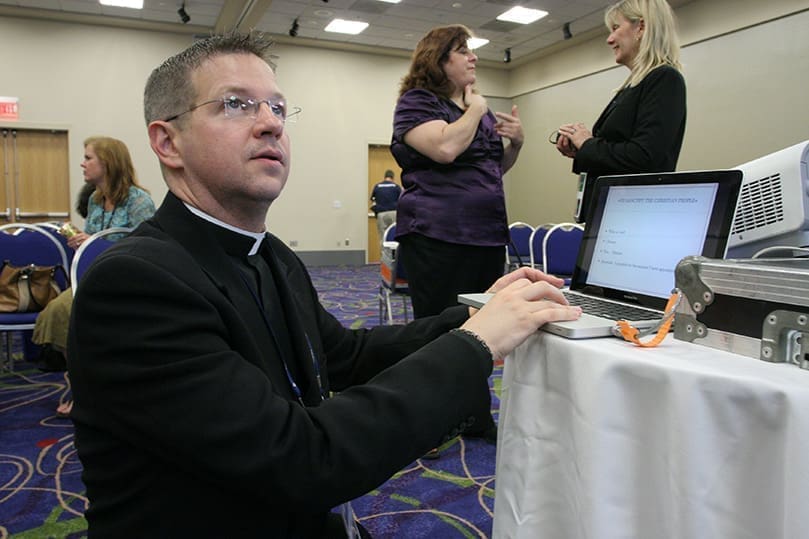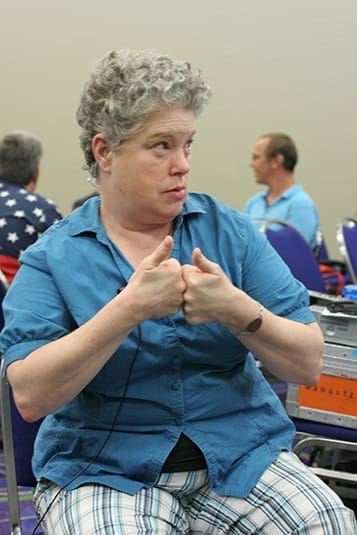 Photo By Michael Alexander
Photo By Michael AlexanderCollege Park
Signed Reconciliation Sacrament Is Gift To Deaf
By SUZANNE HAUGH, Special To The Bulletin | Published June 10, 2010
Frania Franch-Sonner emerged from a makeshift confessional made of a steel frame covered in black velvet drapery in the Kenyan Suite of the Georgia International Convention Center assured that “now I know what to do.”
These words were interpreted by Chase Womack, 19, using American Sign Language. Both attended the Deaf Track of the 2010 Eucharistic Congress, where the deaf and hearing impaired found inspiration and had the opportunity to do something they only occasionally are able to do—experience the sacrament of reconciliation with a priest who knows sign language.
Participants listened and watched as presenter Father Michael Medas shared with them on the topics of being chosen by God and living in the peace and happiness of God. Nestled in between small group sharings and talks by Father Medas were two windows of time for the sacrament of reconciliation in ASL with the visiting priest.
Sharing critical sacramental moments with a signing priest is rare for many with hearing impairments, but awareness of the need of this group within the Church for spiritual counseling and direct communication with priests is growing nationally, said Father Medas. From the Boston Archdiocese, he has served the hearing impaired there as an interpreter and has served on a larger scale as a past member of the National Catholic Office for the Deaf board of directors. He currently resides and works at St. John’s Seminary as director of pastoral formation.
Franch-Sonner described her own faith journey, how it was impacted by her mother who was a “strong Catholic,” and the challenge of experiencing the sacraments.
“It was really hard for me,” she said through an interpreter. “My mother used visuals to help me understand (the faith).”
When she was young and preparing for the sacrament of reconciliation her mother suggested she write something down for the priest to read.
“I had my confession ready. The priest made suggestions and wrote those down as well. I was limited in my communication with him, though,” she said.
Not until she attended college for the hearing impaired did she see an interpreter. “It was then that I started to really understand the Catholic faith.”
Still, finding priests who know sign language has been challenging. She was 40 when she first experienced the sacrament of reconciliation with a signing priest present at a conference sponsored by the National Catholic Office for the Deaf.
She commented on the difference in meeting with a priest who knows sign language.
“Through sign language it is more from the heart. When I write it down, I’m limited in what I say, and the priest can’t ask questions … can’t counsel as well or give suggestions or feedback on what I’m doing,” she said.
Deb Garner, coordinator of deaf services with the Disabilities Ministry of the Atlanta Archdiocese and deaf ministries organizer at Transfiguration Church in Marietta, said that there are no signing priests in the Archdiocese of Atlanta at this time. Still, she makes sure there are seasonal opportunities every year for the hearing impaired to experience the sacrament of reconciliation through direct communication with a signing priest brought in for each occasion.
“It’s crucial,” she said, and explained the dire need also for priests who can communicate directly in ASL and provide comfort for such important moments as the anointing of the sick.
Franch-Sonner’s mother ensured that her daughter grew up with a “good grasp” of the English language, making it easier for her to interact with hearing individuals, but that is not the situation for many others who may then become isolated. Fortunately there are many committed individuals called to bring the faith to the deaf and hearing impaired.
Like Garner, interpreter Salena Troy passionately serves the local hearing-impaired population. She is a convert to Catholicism led on the path to the church by the Blessed Mother.

Sue Reagan, a friend of the deaf community and a member of Transfiguration Church, Marietta, participates in a breakout session during the Deaf Track. Reagan has been using American Sign Language for 25 years. Photo By Michael Alexander
“I wanted to know why Catholics loved and honored her so much,” Troy said.
She spoke with a priest, felt “comfortable” and like she belonged at Mass and eventually entered the church, understanding that God had a reason.
“I felt called to convert to Catholicism and to bring my skills and love of the deaf community to the church, to help make the church more available,” she said.
She serves as the coordinator of services for those with disabilities at St. Pius X Church in Conyers. She shared a story of parents who left the church because they felt there was not a place for them and their son who had many disabilities. When the couple learned of the program at St. Pius, they began working with Troy, who helped to develop a program specific to their son’s needs, as she does with other participants. The entire family eventually returned to their Catholic roots.
“If you build it, they will come,” Troy believes.
She applauded Archbishop Wilton D. Gregory’s efforts to attend to the needs of the area.
“Archbishop Gregory is a breath of fresh air because it is so important to him to reach out to everyone, to every race … just like Jesus. It’s our calling to bring them in, to bring them to the Eucharist.”
Archbishop Gregory paid a visit to the small roomful of participants, granting them a blessing and offering words of encouragement.
“The Eucharistic Congress is prepared for you so you can share with all of us the joy of these days,” the archbishop said. “God bless you and I hope you enjoy your day as much as we have enjoyed having you.”
Father Medas appreciated the archbishop’s commitment to the deaf and hearing impaired, which is evident in events like the Deaf Track, other annual events, and the work of priests, religious and laity to include the needs of people with disabilities in their ministries. He commented on the increasing awareness across the country of the need to minister to the hearing impaired despite budget limitations. Proof of this was the Boston ordination to the priesthood of a deaf man, who will serve the deaf community and also the hearing community through an interpreter.
Father Medas recognized, too, “the wonderful work of the interpreters to provide access in loving and respectful ways.”
“These people don’t look at it as a job but more as a vocation to the Church,” he said.
One of those is Womack, a student at Clemson University who aspires to become fluent in ASL. He finds interpreting fulfilling and is one of just a few male interpreters in Georgia.
“It’s meaningful; I do love to do it, to help people,” Womack said.
During the Eucharistic Congress, interpreters sign at general sessions, at Benediction and adoration, and at Mass.
Father Medas also remarked that within the past year Pope Benedict XVI convened a meeting regarding this population within the church and expressed his acknowledgement of and appreciation for the gifts the deaf bring to the church, saying, “We are less without them.”
Father Medas shared his experience of isolation after being asked to learn ASL as a priest.
“Everyone was signing and it went flying over my head. … I felt so out of place. I knew in my mind that everyone was communicating but it didn’t mean anything to me,” he said.
He studied diligently, learning this new language.
“Likewise, God comes to us; however, often his presence is there, but we have to learn how to recognize it,” he said.